1954 – 1958: Ivan L. Bennett, Jr., MD
Ivan L. Bennett, Jr., a quintessential physician-scientist, assumed leadership of what would become the Division of Infectious Diseases in 1954, having made substantial contributions to the understanding of how infectious agents interact with host defense systems to produce fever and septic shock. A prolific author, he published more than 100 research papers over the course of his career. Under Dr. Bennett, the division became more outward-looking, expanding through diversification of research funding sources and recruitment of outstanding individuals from across the United States and abroad.
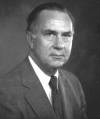
1958 – 1966: Leighton E. Cluff, MD
Leighton E Cluff was a native of Salt Lake City, Utah, and received his undergraduate degree from the University of Utah in 1944 with a major in biology. While a medical student at George Washington University School of Medicine in Washington, DC, he participated in a pathology fellowship at Gallinger Municipal Hospital (later DC General Hospital) that would mark a pivotal point is his career. He gained an interest in the pathogenesis of tuberculosis and other pulmonary diseases, and eventually became an international authority on pharmaco-epidemiology and drug surveillance programs. Cluff worked closely with Dr. Ivan Bennett to establish the Division of Infectious Diseases at Johns Hopkins and continued to expand the clinical and research activities of the division throughout his tenure.
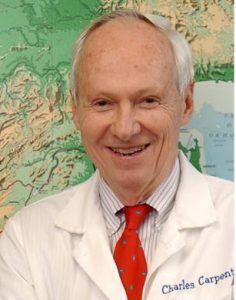
1966 – 1969: Charles Carpenter, MD
Charles Carpenter was born in Savannah, Georgia, and earned his undergraduate degree in English literature at Princeton University. He completed his medical training at Johns Hopkins University School of Medicine, and founded the Johns Hopkins Cholera Research program in Calcutta, India, in 1962. In India, Dr. Carpenter led a team responsible for developing lifesaving oral rehydration therapy designed for resource-limited settings. Upon his return to Baltimore, he served as chief of the Division of Infectious Diseases and remained active in cholera research. Dr. Carpenter was a revered mentor to researchers and clinicians worldwide and a pioneer in the field of global health.
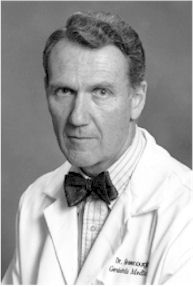
1969 – 1977: William B. Greenough, III, MD, FACP
William B. Greenough, III, was raised in Providence, Rhode Island, graduated magna cum laude from Amherst College, and received his medical degree from Harvard cum laude. Early in his career, Dr. Greenough was part of the Pakistan-SEATO Cholera Research Laboratory in Dhaka, Bangladesh, working to treat cholera patients and train local physicians and nurses in intravenous rehydration therapy. In 1969, he was named chief of the Division of Infectious Diseases at Johns Hopkins, where he continued his work on cholera and related diarrheal diseases. Greenough’s research led to the discovery of the mechanism of action of the cholera toxin, which influenced the development of a cholera vaccine. Dr. Greenough served as division chief until he returned to Bangladesh in 1977 to establish the International Centre for Diarrhoeal Disease Research Bangladesh.
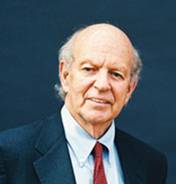
1980 – 2006: John G. Bartlett, MD
John G Bartlett, MD received his undergraduate degree from Dartmouth University in 1959 and earned his medical degree at Upstate Medical Center in Syracuse, New York, in 1963. After residency at the University of Alabama at Birmingham, fellowship in infectious diseases at the University of California, Los Angeles, and the Wadsworth VA Hospital in Los Angeles, Bartlett served on the faculty at UCLA and Tufts University School of Medicine. He was recruited to lead the Johns Hopkins Division of Infectious Diseases in 1980, establishing a legacy of our worldwide efforts to understand, prevent, and treat AIDS. Dr. Bartlett was the first to direct AIDS clinical trials in Baltimore for new treatments designed to prevent HIV from replicating, he pioneered the model of dedicated inpatient and outpatient care for people with HIV that grew into the largest program for HIV care in Maryland, and was a compassionate champion for people with AIDS at a time when little was known about the disease and discrimination against these patients was rampant. Bartlett co-chaired a national committee that drafted the CDC’s first and all subsequent treatment guidelines for people with HIV, counseled countless medical societies and public health ministries around the world on AIDS and other infectious diseases, and advanced research in pulmonary infections, Clostridium difficile, HIV, bioterrorism, and antibiotic resistance.
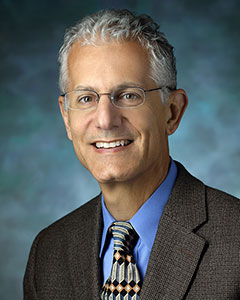
2006 – 2022: David Thomas, MD, MPH
David Thomas is Stanhope Bayne-Jones Professor of Medicine at the Johns Hopkins University School of Medicine and Professor of Epidemiology in the Bloomberg School of Public Health. He also serves as co-director of the Johns Hopkins Center for AIDS Research Clinical Core. Dr. Thomas earned his undergraduate degree in chemistry and his medical degree from West Virginia University. He completed medical training and residency at Wake Forest University in North Carolina before coming to Johns Hopkins as a research fellow in infectious diseases, joining the faculty in 1993. Thomas oversees clinical research projects whose aims are focused on understanding the natural history and pathogenesis of hepatitis C virus infection. Liver disease in HIV infected people is a special area of clinical and research focus. He is the principal investigator on several National Institutes of Health grants and holds a U.S. patent. Dr. Thomas has received numerous awards and honors for his work in advancing care for people living with hepatitis C and HIV.

2022 – Present: Amita Gupta, MD, MHS
Amita Gupta is Professor of Medicine at the Johns Hopkins University School of Medicine and Professor of International Health at the Bloomberg School of Public Health. She is also the faculty co-chair of the Johns Hopkins Gupta-Klinsky India Institute. Dr. Gupta received her undergraduate degree from the Massachusetts Institute of Technology, her medical degree from Harvard Medical School, and a Master of Health Sciences in clinical investigation from the Bloomberg School of Public Health. She completed her internal medicine training at San Francisco General Hospital-University of California, San Francisco, followed by post-doctoral fellowships in foodborne and diarrheal diseases with the US Centers for Disease Control and Prevention, and in infectious diseases at the JHU School of Medicine. Dr. Gupta specializes in international public health, clinical research, and education in infectious diseases, HIV/AIDS, tuberculosis (TB), maternal health, and antimicrobial resistant infections. Since 2003, her work has been focused primarily on India, where she leads several Indo-JHU research collaborations.
